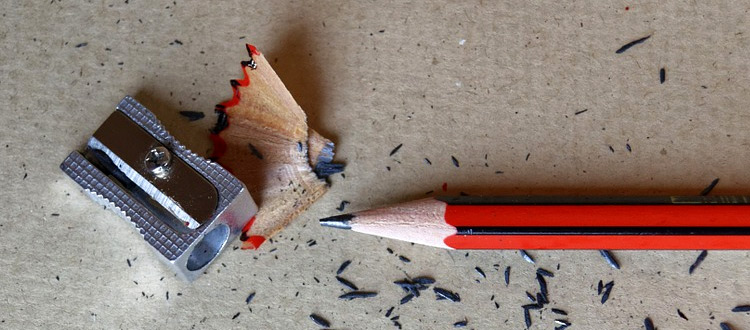Best Pencil Sharpeners For 2024 (Electric & Manual)
Whether a simple yellow #2 or a brilliant Prismacolor, a pencil sharpener is a must-have.
But the type of pencil sharpener you need can vary based on what you’re using it for. It can make finding the perfect sharpener a real pain in the butt.
That’s why I wrote this guide detailing the best pencil sharpeners for every scenario. To save time I’ll share my top picks for the best manual and electric sharpeners directly below. But keep reading to see my other suggestions along with detailed reviews for each one.

Prismacolor Sanford VE99016
The perfect sharpener for artists. This works with all art pencils, colored pencils, watercolor pencils, and even works well as a manual sharpener for school or home use.
Plus you can’t beat the great price tag.
Top Features:
- Two sharpening blades
- See-through body makes emptying simple
- Works great for art and general home & school use

X-ACTO ProX
A strong pencil sharpener with 6 different sharpening holes. Auto-shutoff helps reduce broken lead and the motor is uber quiet. A great choice for your home office or work desk.
Top Features:
- 6 sharpening holes
- Large shavings container means less time emptying
- Automatically moves the blades away from the pencil once it’s sharp enough
Note this guide offers tips primarily for artist pencils but my reviews consider all pencil types for all sharpeners.
Whether you need one for the office, for school use, or just general home use, this guide will help you find something great.
And to make this easier to navigate you can use the table of contents below.
Table of Contents
How To Pick A Good Sharpener
Both manual & electric pencil sharpeners aim to accomplish the same goal.
With electric you have far less control of the process and you risk breaking your lead more often. But these are also easier to use and they usually come with built-in storage for the shavings.
Really when you’re picking a pencil sharpener you first need to decide why you need one.
If it’s for home use then electric is typically best.
However if you don’t have a lot of desk space then a small manual sharpener would fit easier.
Artists should almost always use manual sharpeners because they’re easier to control, offer more sharpening options, and are super portable for drawing on the go.
Here’s a quick list of some typical features to look out for:
- Size of hole openings(8mm being the most common)
- Total amount of lead exposed
- Final sharpness
- Risk of breakage
A lot of the risk in breaking a pencil comes from how much pressure you apply during the process.
If you’re working with an electric sharpener it’s going to apply whatever pressure it was built for. That’s why electrics aren’t as good for art pencils that have softer graphite.
These are just some of the things to keep in mind but everyone’s requirements will vary.
I’ll cover all of these points in my reviews so let’s dive in and take a look!
Best Manual Pencil Sharpeners(For Artists)
To start let’s go over manual pencil sharpeners and the best options here, mostly for artists.
Note that just because these recommendations are meant for art pencils does not mean they’re art-only. If a manual sharpener works well for any of the best art pencils out there then you can rest assured it’ll work just as well for average writing pencils too.
The biggest benefit of manual sharpeners is that they’re smaller and cheaper.
Keep that in mind when going through these reviews so you have an idea of what to expect.
Top Pick: Sanford VE99016 Prismacolor Premier


My absolute top recommendation for the best manual sharpener is the Sanford VE99016 built by Prismacolor.
They design top-notch art materials and this sharpener offers a lot. The side grip is easy to hold and when you flip the top you have two different sharpening blades to work with.
As far as sharpeners go this one is designed specifically for all types of art pencils including colored pencils. This means you’re safe to work with pretty much anything and never worry about breaking the tips.
Just note that when you’re sharpening you have to keep an eye on how far you’ve gone with the lead.
It’s easy to keep going and sharpen a little too much which is a guaranteed way to break off the tip.
Also the flip top is easy to open but the inner top is a little trickier. You have to hold the back of the sharpener and push up on the top to pop it off and toss the shavings. It’ll get easier with practice.
The design is sturdy, the blades work incredibly well, and this is definitely affordable making it the best portable sharpener for anyone(artist or not!)
Pros
- Offers a wide point and sharp point hole
- Designed for colored pencils & regular pencils
- Translucent so you can see when it’s time to empty
Cons
- A little tricky to open the top
Prismacolor Scholar


Here’s another Prismacolor sharpener that I think deserves some praise.
It’s quite a bit smaller and simpler than the Sanford so it may not work for everyone. But I really like the Prismacolor Scholar for its smaller size and easy-access shavings compartment.
This one does not come with a flip top so you can just go to town sharpening right away.
The actual hole is designed so it gets thinner towards the bottom. This way lead and shavings won’t fall out if you tip it upside down.
The Scholar is super small measuring maybe 2 inches. This thing can fit into your backpack or even your pocket if you’re traveling light.
Since this is so lightweight you can also twist the sharpener instead of the pencil when you’re sharpening. This way you’re far less likely to see any breakage.
Pros
- Super small and easy to carry anywhere
- Very affordable considering the quality
Cons
- Can feel a bit less sturdy than the Sanford
- Doesn’t expose very much lead after sharpening
Staedtler Manual Pencil Sharpener


Staedtler builds some great sharpeners with a mix of wood and plastic.
I’m a fan of the plastic Staedtler sharpener because it feels a bit sturdier. With wood sharpeners you also have to worry about them warping and affecting the metal blades inside.
Now the one thing that really gets me about this sharpener is the actual tip you get out of the sharpening job. Doesn’t matter if you’re using a #2 for homework or a pricey branded art pencil.
Your lead tip is basically guaranteed to come out sharp and stay that way.
It exposes plenty of lead so you won’t need to sharpen as often either.
One minor nitpick is the difficulty of emptying this thing. It can fill up fast and you’ll be unscrewing the top a lot.
It can take a little elbow grease to get the top off but once you get used to it you’ll be fine.
Overall a fantastic manual sharpener for everyone: kids, adults, artists, office workers, students, you name it.
Pros
- Super simple and works great with every pencil
- Sharpens to a very fine point, finer than most
- Exposes plenty of lead so you can sharpen less often
Cons
- Smaller body doesn’t hold as many shavings
- The cap is a bit tough to screw on after emptying
Faber-Castell Grip Trio Sharpener


Another trusted brand in the art world is Faber-Castell. They produce a ton of incredible supplies and this Trio Sharpener is one such example.
This comes with three different holes for sharpening graphite, colored pencils, and jumbo pencils. Talk about convenience!
Both sides of the sharpener have compartments for shavings so this will store quite a bit. You won’t find yourself emptying this too often so you can focus more on what you want to do: draw!
The top portion is labeled “colour” and the bottom portion is for universal pencils.
I’m not sure how the actual blades differ or if the top hole is built for less breakage. All I can say is this works exactly as intended.
It will feel a bit weird to empty at first since you can remove both the top and bottom sections. But just like all the other sharpeners here, the more you use it the more comfortable it’ll feel.
Pros
- Has 3 sharpening ports for colored pencils, regular pencils & jumbo size
- Excellent choice for artists who use graphite and carbon
- The shaving holders are easy to remove and empty
Cons
- Can feel a bit flimsy compared to other manual sharpeners
- The colored pencil hole gives a sharper tip than the other two
Best Electric Pencil Sharpeners
With an electric sharpener you completely remove the effort of twisting and working the pencil to a fine point.
All you need is an outlet(or fresh batteries) and you’re good to go. With these sharpeners you’ll also find more variety in size and shape along with features like extra-large shaving compartments and break-proof automatic shutoff.
I mostly recommend electric sharpeners for everyday use since they can be a tad rough with art pencils.
But there are some good ones in here that support a mix of both so let’s take a peek and see.
Top Pick: X-ACTO ProX Classroom Electric Sharpener


The X-ACTO ProX Classroom edition is surprisingly versatile and just downright easy to use.
The front port can alternate between six different sizes for a variety of pencils. These holes vary in the total width along with how much wood is exposed while sharpening.
But this doesn’t even touch my favorite feature: the auto-flyaway sharpening blade.
The ProX will actually detect when your pencil is sharp enough and it’ll stop sharpening automatically even if the pencil is still inside! You can tell when this happens because the sharpener’s sound changes to a higher pitch and you won’t feel as much pressure on the pencil.
Note this won’t totally solve the problem of breakage if the sharpener is a bit too rough for your pencil lead of choice.
But it’ll help radically reduce problems making it a safer choice for basically everything.
With suctioned feet and a fairly heavy base this thing won’t be moving too much either. It’s definitely one of the sturdier electric models out there.
Also the shavings container is massive so you won’t need to change that very often. It’s actually transparent so you can just peek through to see if it needs emptying.
For everything you get with this model I cannot imagine recommending anything else.
If you want a top-of-the-line electric sharpener then I highly recommend the ProX Classroom edition.
Pros
- Automatic flyaway cutter prevents from over-sharpening
- Incredibly sturdy build with rubber feet
- Six(6) different ports to switch between
Cons
- The internal blades can get dull with frequent use
X-ACTO XLR Sharpener


Here’s another model from X-ACTO that’s a step down from the ProX but is still a really solid choice.
The X-ACTO XLR looks like your more traditional pencil sharpener. It has one hole for sharpening and the body is shaped like a long rectangle.
This one also gets plugged into the wall so it should work with any desk near any outlet. And based on the quality of the sharpening job I’d say this is mostly good for home offices or kids’ rooms, even study rooms.
Inside the XLR is X-ACTO’s proprietary PencilSaver tech which prevents oversharpening. Basically it detects when enough lead is exposed and it’ll automatically stop sharpening. Pretty handy and it seems like a staple if you’re going with an electric model.
The motor is plenty strong enough but it does feel weaker than its ProX counterpart. It still has the same protective design and larger interior for holding lots of shavings.
But one big downside is how often this model sheds pencil shavings while in use.
It’s much more common with brand new pencils but you’ll probably notice this every time you sharpen. It’ll make a small mess outside the front which isn’t too bad, but you’ll find yourself cleaning up every so often.
With a fairly quiet motor, plenty of space for shavings, and built-in prevention tech to reduce broken pencils… I’ve gotta say this is a nice step down from the ProX if you want something a little more quaint.
Pros
- Long rectangular body fits plenty of shavings
- The motor sound isn’t too loud or grating
- Detects when pencil is sharp enough and automatically moves the blade
Cons
- Tends to shed shavings while in use
- A bit pricier than some others without as many features
Jarlink Electric Sharpener


The Jarlink Electric Sharpener feels very much like the XLR unit I reviewed above.
However this one comes with a totally unique design and a much better top-down sharpening port.
Oh and I should mention that this runs on four AA batteries rather than wall power. You can still use the AC adapter if you prefer that, but with this model you at least have the choice of using battery power too.
The sharpening process goes fast and it can finish a pencil within 5-10 seconds. After that point it’ll move the motor away from the lead to prevent it from being over-sharpened or breaking.
If you look at the design you’ll notice this sharpens from the top which only has one hole. This fits the standard 8mm pencil size but can fit larger pencils up to 10mm too.
Also another nice feature is the auto-shut off whenever you open the lid. This makes it a super safe choice for young kids because they can’t do much damage with this thing even while plugged in.
I’ve seen practically no shavings leak out and I personally think it’s because of the design.
In many ways it just makes sense to use a vertical sharpener if you go electric. Yes it can be a little weird at first, but over time you get used to it and may even prefer it.
Jarlink’s vertical sharpener is my pick for the best mid-range tall electric pencil sharpener.
If you can’t afford(or don’t want) something as flashy as the ProX then this is my recommendation for typical daily use.
Pros
- Can run on AA batteries or AC power
- Auto-shutoff feature makes this incredibly safe for all ages
- Stands tall storing plenty of shavings without cramping your desk
Cons
- The vertical design feels very weird at first
TripWorthy Pencil Sharpener


Getting back to rectangular designs we have the TripWorthy Electric Sharpener designed to be fully battery operated with no extension cord.
I’ve come to loathe wire management so the fewer wires I have around, the better. You probably feel the same way.
That’s one of the biggest benefits of this TripWorthy sharpener. It also comes with an auto-stop feature that prevents this from running if any of the parts are open or removed.
So if you’re looking for a sharpener that’s safe around your little ones this should do the trick.
What I like most is the simple design and lightweight container. You can toss this in your backpack or art supply bag with ease.
Since it runs on batteries you also won’t need to worry about finding an outlet if you’re drawing in the wilderness.
The sharpening process is real easy and surprisingly quiet. It doesn’t make your point as sharp as some other models but it does get them pointy enough.
That’s why I recommend this for artists too because it’s less likely to break your tips.
Now it does sharpen pencils at a slight angle so you’ll typically see more lead exposed on one side. As you write(or draw) the lead whittles down faster on one side.
This probably won’t be a huge deal but it’s one of the only complaints I have.
One other point is the sharpener’s front-facing compartment for shavings. It definitely works well but removing it can be a pain.
If you just pull it off you’ll spill shavings all over your desk. So you have to tilt it over and then pull to keep the shavings in one spot before dumping.
Not a big deal but just something you’ll have to get used to. And it’s a minor complaint if you consider this amazing design and versatility.
Overall this is an electric sharpener I just couldn’t leave out.
Really this makes for something you can use with any pencil and for any purpose. The lack of an AC power cord makes it all the more appealing for portability too.
Pros
- Battery-operated with no extension cord
- Very lightweight and perfect for bringing on the go
- See-through shavings holder lets you know when it’s time to empty
Cons
- Sharpens lead at an angle which makes wood exposure uneven
- Emptying shavings can be tricky since you have to tilt it sideways
Most Affordable Pencil Sharpener


If you’re looking to get the most bang for your buck then check out this small Staedtler metal sharpener.
This is a manual sharpener and it’s the best option for a budget pick. You’re unlikely to find any kind of electric sharpener in this price range anyways!
But this has a lot going for it. The little metallic sharpener has two sharpening holes with one for regular pencils, another for jumbo sized pencils.
It also works great for all types of art pencils because of the blade design.
Staedtler knows art materials so you can bet your bottom dollar this thing will last for a long time. This is one of the few metal sharpeners I actually prefer over the many plastic and wood designs.
Really there’s not a whole lot else to say!
Cheap, easy to use, and supports two different sharpening styles for various pencils. A fantastic budget choice for art pencils or everyday use.
Pros
- Super affordable
- Two holes for regular and jumbo pencils
- Works great with art pencils and regular writing pencils
Cons
- Very small and easy to lose
- Claims to be made in Germany but is actually made in China
Finding Your Sharpener
With all these options you may not know where to look. But remember it’s just a pencil sharpener.
Granted you do want something that’ll fit your needs and stand the test of time. But with any of my top picks, manual or electric, you simply cannot go wrong.
For artists I usually recommend manual sharpeners just for good measure and the Prismacolor Sanford is gonna be your best bet.
Likewise if you’re an artist, student, or just someone with an office missing a sharpener then I highly recommend the X-ACTO ProX Classroom. It’s got a ton of variety with 6 sharpening holes and plenty of storage space for shavings.
But have another glance over this list and see if anything else catches your eye.
The right sharpener will last for years and it should be something you truly enjoy using.













